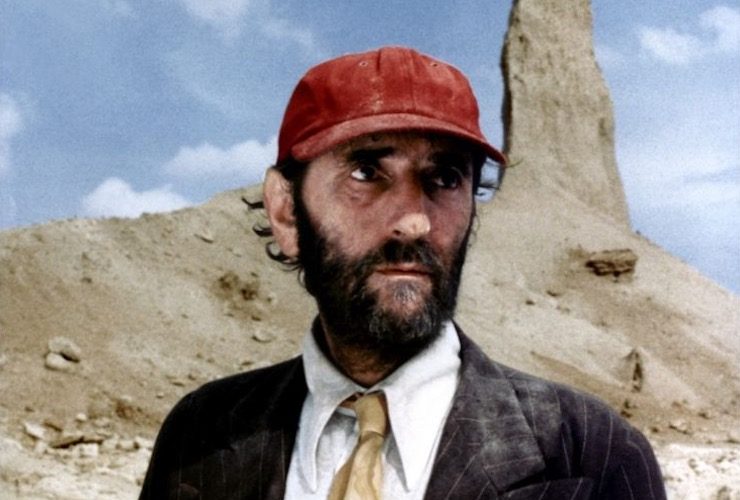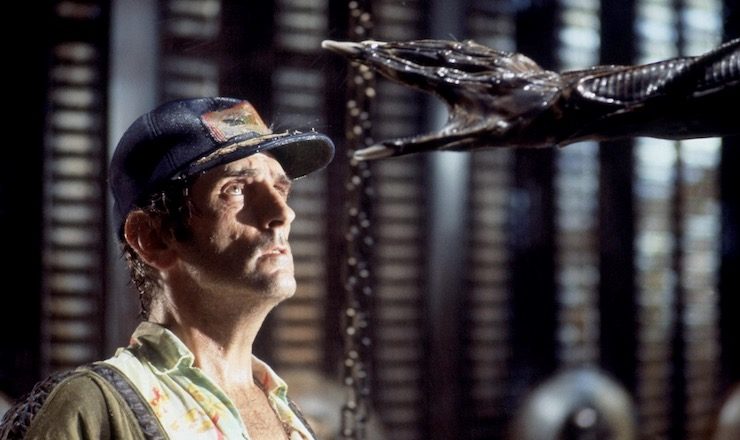The trope of the everyman—the “ordinary,” relatable, sometimes boring character dropped into unusual circumstances—will always have a place in the world of science fiction and fantasy. Many stories simply cannot function without one, especially those involving a collision of the fantastic with the mundane.
Some obvious examples would be Chief Brody in Jaws (1975), trailer park resident Alex Rogan in The Last Starfighter (1984), and damn near every protagonist, man or woman, in a Stephen King novel. A more obscure example that remains close to my heart is Danny Glover’s character in Predator 2 (1990). Rather than following up the first film with yet another implausible muscle-bound Übermensch, the sequel features a middle-aged guy huffing and puffing through various chase scenes, looking like he’s too old for this shit (sorry, couldn’t resist).
Of course, the term “everyman” is troublesome; the trope in my opinion anyway, should not be restricted to a particular demographic. That being said, a more recent example would be Ellen Page’s character in Inception (2010). She is reliable, smart, and curious, though a bit flat—which, I suppose, might be the point. Her main role in the plot is to walk us through the film’s dream world, establishing the rules of the story and asking questions on behalf of the audience. You can tell right away what the filmmakers are trying to do, and yet this approach to exposition, however clumsy, gets the job done.
This past summer, one of cinema’s most revered everymen turned ninety years old: character actor and national treasure Harry Dean Stanton. Like many people, I reacted to that news by asking, “How can he be ninety? He’s been sixty for the past fifty years!” A veteran of over 100 films, Stanton has made some of his most memorable contributions within the SFF genre, bringing humanity, quirkiness, and depth to roles that would be forgettable had they been played by anyone else. His versatility demonstrates the potential of this overused trope. When rendered correctly, the everyman character can (and should) go from mere storytelling device to a real, fleshed-out person.
Not surprisingly, Stanton’s own life provides some indication of where his acting career was headed. Born in rural Kentucky, Stanton served as a cook on board a Navy ship during the Battle of Okinawa. When I first read that, I had to stop and read it again—it was too perfect. I’m picturing him rolling his eyes at the sound of cannons blasting overhead, all while flipping pancakes on a griddle and puffing on a cigarette. Somehow, Hollywood has yet to cast him in this exact role.

To clarify, Stanton often plays the everyman several years after his encounter with the unknown, the alien, the mystical, or the divine, and we see in his haggard face how this experience has transformed him. In Escape from New York (1981), for example, Stanton plays Brain, an inmate in the maximum-security prison of Manhattan. Though he serves as an advisor to the de facto leader of the prisoners, we discover early on that he’s just plain old Harold Helman, a sad sack criminal whose bad luck finally caught up with him. Upon meeting Brain, the film’s protagonist, Snake Plissken (Kurt Russell), delivers one of my favorite throwaway lines ever, the kind that SFF stories rely on to build a world and add texture to a character:
Plissken: I’m glad you remember me. Yeah, a man should remember his past. Kansas City, four years ago, you ran out on me. You left me sittin’ there.
Brain: You were late.
Plissken: We were buddies, Harold. You, me, and Fresno Bob. You know what they did to Bob, huh?
In Repo Man (1984) Stanton’s character Bud takes young Otto (Emilio Estevez) under his wing in the high risk, low reward business of repossessing cars. The film is at its best when it allows Bud to drop pearls of hard-earned wisdom, usually while consuming a substance to help bring out the truth:
Tense situations, kid. You get into five or six of ‘em a day, it don’t mean shit anymore. I mean, I’ve seen men stabbed, didn’t mean shit to me. I’ve seen guns, guns too, they don’t mean shit. But that’s when you gotta watch yourself.
Of course, a few years earlier, Stanton played the grizzled engineer Brett in Alien (1979), a blue-collar guy who stumbles into one of the most suspenseful death scenes ever. I like to think of Bud as a version of Brett, had he survived his encounter with a xenomorph. “I’ve seen aliens, they don’t mean shit…”

Stanton spent years playing oddball types until his breakout opportunity came in Wim Wenders’ Paris, Texas (1984), in which he portrays a downtrodden man walking across the American Southwest, hoping to reunite with his family after years of self-exile. Though Stanton barely speaks in the role, the film reveals his remarkable range and authenticity, helping to establish him as a fixture in movies even as he approached retirement age.
Also in 1984, Stanton appeared in an overwrought yet very effective scene in Red Dawn, the story of a Soviet invasion of North America. Though his highly quotable line “Avenge me!” is a bit melodramatic, it’s the look on his face that sells the scene. In his sunken eye sockets and thousand-yard stare, we see the human toll of a global war—a surprisingly emotional moment in what is otherwise a straight action movie.
Even in the role of Paul in The Last Temptation of Christ (yes, I count that as an SFF film), Stanton wears a familiar wizened look, depicting the apostle as less of a saint than a working stiff who is stuck in his job like any other repo man or cook or ship’s engineer. In one of the film’s most important scenes, Jesus, having miraculously escaped death, accuses Paul of fabricating the resurrection. Paul’s response, reminiscent of Bud’s advice to Otto, is to say, in essence, “Look, this is just what I do, okay?”
Roles like these helped to make Stanton a favorite of director David Lynch, who cast him in a number of projects, from Wild at Heart and Inland Empire to Twin Peaks: Fire Walk With Me and the new Twin Peaks reboot, which premieres on Showtime in 2017. In the documentary Harry Dean Stanton: Partly Fiction (2013), we get the pleasure of seeing the actor and the director chilling out on a couch together, reminiscing about their work. “He’s got this innocence and naturalness that’s really rare,” Lynch says. “It’s just real.” It is a sentiment that continues to land Stanton in both independent films and major blockbusters, including a cameo in The Avengers (2012)—as a humble yet wise security guard, of course.

What’s perfect about the timing of Stanton’s career is that he came into his own when science fiction was at last moving away from its gleaming, idealistic portrayal of the future in the mid-twentieth century. By the time we meet Brett in Alien, the silver rocket ships and shiny skintight jumpsuits and perfectly coifed Aryan men have long since faded. In their place are real people, who face the real-life consequences—both good and bad—of venturing into the unknown. All storytellers should take into account the steep price their characters have to pay when their world gets turned upside down—the way it changes them, the way it hurts them, the way it forces them to rise above who they have been for their entire lives. Thanks to Stanton, over 100 films have this empathy built in.
 Robert Repino (@Repino1) grew up in Drexel Hill, Pennsylvania. After serving in the Peace Corps in Grenada, he earned an MFA in Creative Writing at Emerson College. He is the author of Mort(e) (Soho Press, 2015), Leap High Yahoo (Amazon Kindle Singles, 2015), Culdesac (Soho Press, out November 15, 2016), and D’Arc (Soho Press, forthcoming). He works as an editor for Oxford University Press and has taught for the Gotham Writers Workshop.
Robert Repino (@Repino1) grew up in Drexel Hill, Pennsylvania. After serving in the Peace Corps in Grenada, he earned an MFA in Creative Writing at Emerson College. He is the author of Mort(e) (Soho Press, 2015), Leap High Yahoo (Amazon Kindle Singles, 2015), Culdesac (Soho Press, out November 15, 2016), and D’Arc (Soho Press, forthcoming). He works as an editor for Oxford University Press and has taught for the Gotham Writers Workshop.










